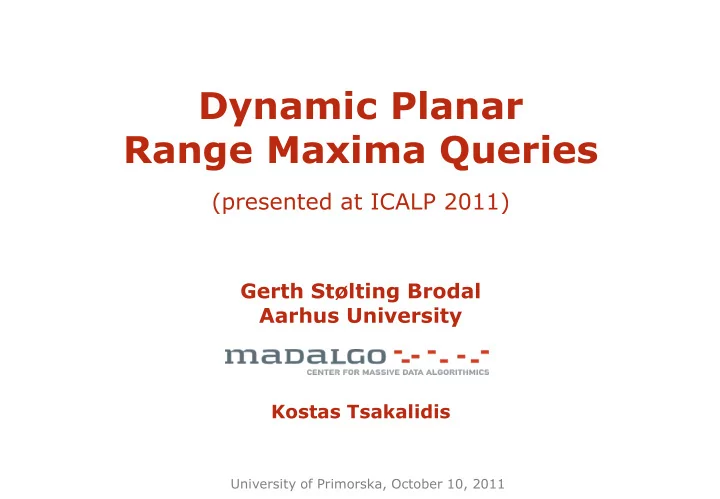

Dynamic Planar Range Maxima Queries (presented at ICALP 2011) Gerth Stølting Brodal Aarhus University Kostas Tsakalidis University of Primorska, October 10, 2011
Orthogonal Range Queries y t y b x l x r 2
Priority Search Tree [McCreight’75] Space: O( n ) Update: Recursively move up maximum y O(log n ) 1-Sided reporting: O(t) y 3
3-Sided Reporting Queries O(log n + t ) y b x l x r O(log n ) trees 4
Orthogonal Range MAXIMA Reporting alias “Generalized Planar SKYLINE Operator” Dominance Maxima Queries Report all maximal points among points with x in [ x l ,+∞) and y in [ y b ,+∞) Contour Maxima Queries Report all maximal points among y t points with x in (- ∞, x r ] 3-Sided Maxima Queries Report all maximal points among points with x in [ x l , x r ] and y in [ y b ,+∞) x l x r 4-Sided Maxima Queries Report all maximal points among points with x in [ x l , x r ] and y in [ y b , y t ] Static maximal points in O( n∙ log n ) time [Kung, Luccio, Preparata, J.ACM ’ 75] 5
Dynamic Range Maxima Reporting Space Insert Delete Overmars, van Leeuwen ‘81 n log n + t log 2 n + t log 2 n log 2 n + t Frederickson, Rodger ‘90 n log n + t log n log 2 n log n (1+ t ) Janardan ‘91 n log n + t log n log 2 n Kapoor ‘00 n log n + t amo. - log n n log n / loglog n + t log n / loglog n [ICALP ’ 11] n ∙log n log 2 n / loglog n + t log 2 n / loglog n RAM 6
Overmars, van Leeuwen [JCSS ’81] O(log n + t ) Updates: O(log 2 n ) 7
Our Structure - Tournament Tree u Right( u ) = Copy Up Maximum y 8
Tournament Tree Find next point u MAX( ) Right( u ) to be reported in O(1) time y 9
Computation of MAX(Right( u )) MAX(Right( u )) U U L MAX(Right( u L )) MAX(Right( u R )) U R [Sundar ‘89] P riority Q ueue with A ttrition O(1) time 10
Update Operation Space: O( n ) P artially P ersistent Update: O(log n ) P riority Q ueue with A ttrition [Driscol et al. ‘89] amortized O(1) time, space overhead per update step [Brodal ‘96] worst case 11
Priority Queues with Attrition [Sundar , IPL ‘89] Deletemin() InsertAndAttrite(element) O(1) worst case time 12
Partial Persistent Data Structures [Driscoll et al., JCSS ’ 89] “Persistent” = remember previous versions Any pointer-based structure with O(1) indegree Version List Queries Queries & updates only [Brodal, NJC ’ 96] O(1) worst case time overhead per access step O(1) worst case time, space overhead per update step “Rollback” = discard latest version in O(Update) time 13
Dominance Range Maxima Queries O(log n ) trees Query time O(log n + t ) 14
Contour Range Maxima Queries O(log n ) trees Query time O(log n + t ) 15
3-Sided Range Maxima Queries O(log n ) trees Query time O(log n + t ) 16
RAM – O(log n /loglog n + t ) U … • Height O(log n / loglog n ) • MAX(Right(u)) maintained O(log ε n) using Q-heaps [Fredman, Willard, JCSS ´94] 17
4-Sided Range MAXIMA Reporting and Rectangular Visibility Queries Proximity Queries/Similarity Search (- ∞,+∞ ) (+∞,+∞ ) 4-Sided Range 4 x Maxima Queries (+∞, - ∞) (- ∞, - ∞) Space Insert Delete log 2 n + t log 3 n Overmars, Wood ‘88 n ∙log n log 2 n log 2 n + t∙ log n log 2 n [ICALP ’ 11] n ∙ log n log 2 n + t log 2 n log 2 n 18
4-sided Range Maxima Queries Query time O(log 2 n + t ), space O( n ∙log n ) 19
Space Query Insert/Delete O( n ) O (log n /loglog n + t ) O(log n /loglog n ) RAM O( n∙ log n ) O (log 2 n + t ) O(log 2 n /loglog n ) Thank You Gerth Stølting Brodal Aarhus University
Recommend
More recommend